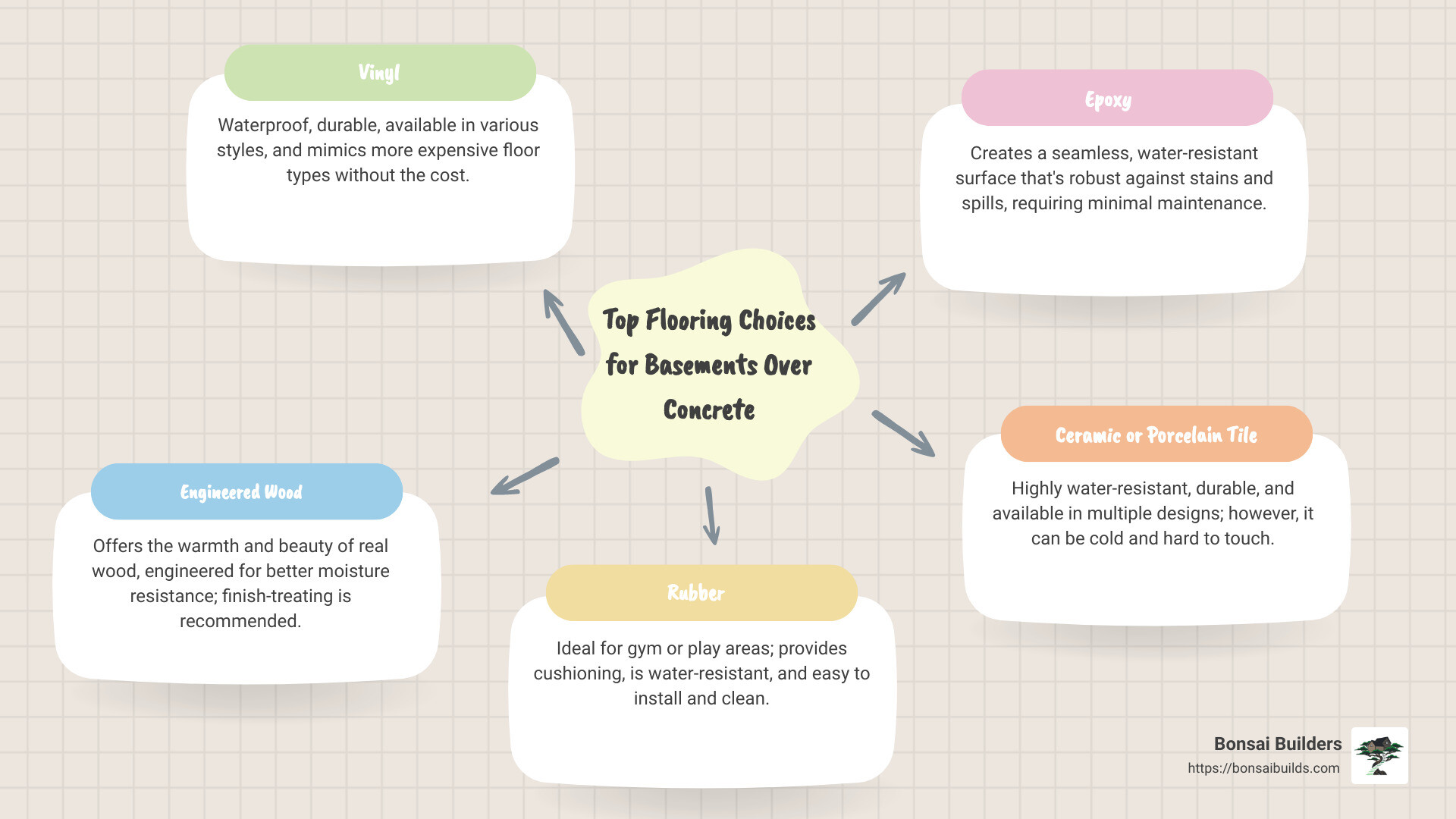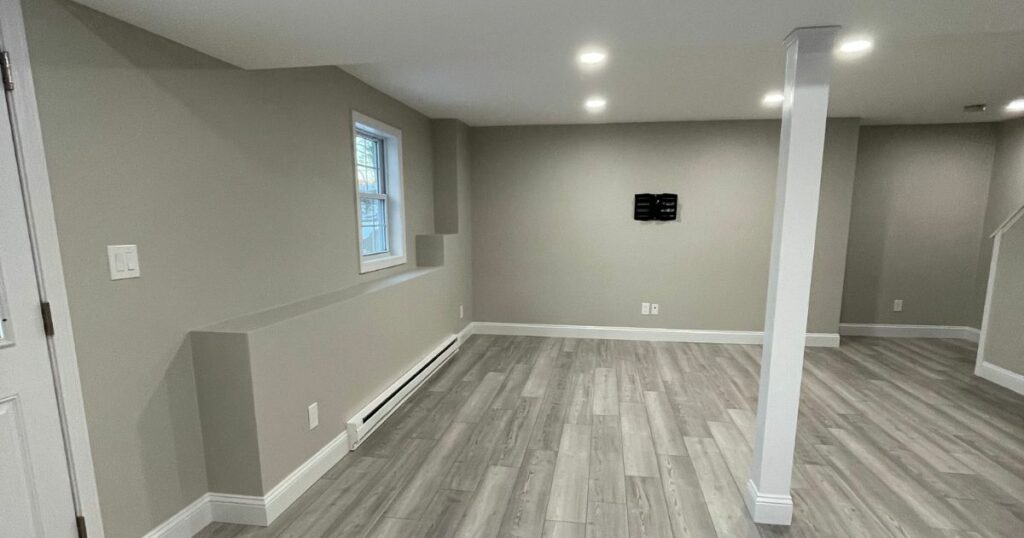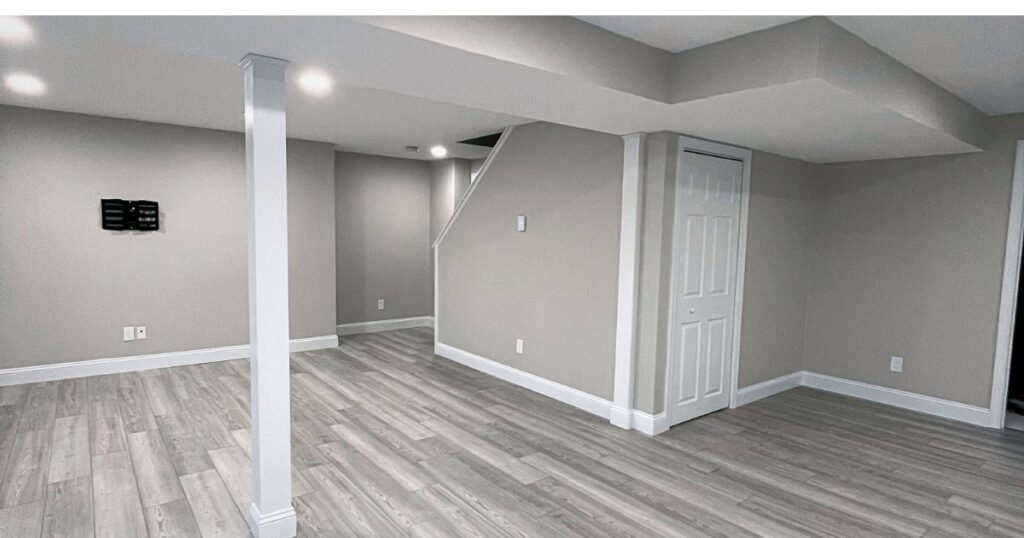Ready to transform your basement? The key to creating a comfortable and inviting space starts from the ground up – the flooring. When it comes to basements, especially those with concrete floors, selecting the right flooring can be the difference between a damp, uninspiring space and a cozy, functional living area.
Whether you’re planning for a home gym, a plush lounge, or an extra family room, the right flooring will bring your vision to life while addressing important factors like moisture resistance, durability, insulation, and maintenance.
Best Basement Flooring Over Concrete
- Vinyl: waterproof, durable, and stylish.
- Engineered Wood: resilient, attractive, but should be finish-treated for moisture resistance.
- Rubber: perfect for gyms or playrooms, easy to install and maintain.
- Epoxy: offers a seamless finish, resistant to moisture and easy to wipe clean.
- Ceramic or Porcelain Tile: extremely resistant to water, but can feel cold and hard underfoot.
- Carpet Tiles: cosy and warm, they offer flexibility and are easier to replace when damaged.
- Interlock Rubber Tiles: provide a durable and versatile flooring option with easy installation, making them ideal for gyms, play areas, and other spaces.

We, at Bonsai Builders, are known for our dedication to quality and attention to detail. As experts in luxury home building, we understand how essential it is to choose the best flooring for your basement.
Table of Contents
n this guide, we delve into the ins and outs of selecting the perfect flooring for your basement over concrete, helping you make a decision that marries durability, aesthetics, and function. Ready to start your basement transformation?
Evaluating Your Basement’s Condition
Before embarking on the exciting journey of choosing the best basement flooring over concrete, it’s crucial to conduct a thorough evaluation of your basement’s current condition. This step is essential for ensuring the longevity of your new flooring and avoiding potential pitfalls down the line.
The Importance of Assessing the Concrete Floor Condition
The condition of your existing concrete floor plays a significant role in determining the type of flooring you can install. For instance, if your basement floor is uneven or has cracks, this might limit your flooring choices, or necessitate additional preparation work.
Any cracks in the concrete should be addressed with a concrete repair kit, and a basement floor sealer should be applied to prevent moisture intrusion. Ignoring these issues could lead to serious problems in the future, including water damage, mold growth, and the premature deterioration of your new flooring.
Addressing Cracks and Uneven Surfaces in Basement Concrete Floors
At Bonsai Builders, we prioritize the integrity of your all new basement flooring. Our team of experts, led by Kristin Hintlian, ensures that any cracks or uneven surfaces are promptly addressed before installing your chosen flooring.
If the concrete floor is in poor condition or the concrete surface is significantly uneven, it might be necessary to install a subfloor before proceeding with the final flooring. This action ensures a level and stable surface for the new flooring material, significantly extending its lifespan.
The Need for a Subfloor: When and Why It’s Necessary
A subfloor acts as a buffer between the cold, hard concrete and your new, comfortable flooring. Not only does floating floor below it provide insulation, but it also offers a smooth and level base for the new flooring material. This layer is particularly beneficial if the existing concrete floor is too cold, uncomfortable, or uneven.
Some flooring options like engineered wood or cork flooring require a subfloor for proper installation. Even if your chosen flooring type doesn’t necessitate one, installing a subfloor solid wood flooring can still be a worthwhile investment for enhanced comfort and durability.
In the end, the goal is to create a basement that is not just aesthetically pleasing but also robust and comfortable.
The Best Basement Flooring Options for Concrete

When it comes to finding the best basement flooring over concrete, there are several options to consider. Each of these comes with its own unique benefits and potential considerations. Let’s take a closer look at each of these options.
Luxury Vinyl Tile (LVT): Features, Benefits, and Installation Tips
Luxury Vinyl Tile (LVT) is a top choice for basement flooring. This synthetic material is easy to clean, highly resilient, and more affordable compared to most natural materials. It’s resistant to scratches, dents, and fading, making it a durable choice for high-traffic areas.
LVT mimics the look of natural materials like hardwood and stone, making it a versatile and stylish option. With a lifespan of up to 50 years, it’s a long-term investment that pays off. As our expert, Kristin Hintlian, notes, LVT is a great option for basements as it is water-resistant, making it ideal for moisture-prone spaces.
When installing LVT, make sure your concrete floor is smooth and level. In some cases, an underlayment may be recommended for better insulation and sound absorption.
Ceramic Tile: Aesthetics, Durability, and Installation Considerations
Ceramic tile is another viable option for basement flooring. It’s water-resistant and comes in a variety of sizes, shapes, and colors. However, it is usually colder underfoot due to its direct adherence to the concrete foundation. It also requires a higher budget and more time for installation. Consider using ceramic tile in specific areas like bars or bathrooms, while opting for other flooring for the main areas of the basement.
Epoxy Flooring: Understanding Its Unique Design and Durability
For a unique and industrial design, consider epoxy flooring. It’s durable and easy to maintain, although it can be cold and hard underfoot. Despite these potential drawbacks, epoxy flooring can give your basement a unique and stylish appeal.
Rubber Flooring: Comfort, Waterproofing, and Cost Considerations
Rubber flooring is another great option for basements. It’s comfortable, water-resistant, and relatively inexpensive. This makes it a good choice for playrooms or home gyms.
Carpet Tiles: A Cost-Effective and Easily Replaceable Option
If you’re on a tight budget, consider carpet tiles. They’re cost-effective and easy to replace if damaged. However, they aren’t known for being moisture-resistant and may require the installation of a subfloor and underlayment.
Engineered Wood: Style, Moisture Resistance, and Vulnerability to Damage
Engineered wood flooring can provide a warm and inviting look to your basement. However, basements are a humid environment, and real wood flooring can warp and twist over time. It’s also more costly and time-consuming to install and replace.
Cork Flooring: Eco-Friendliness, Insulation, and Installation Requirements
Lastly, cork flooring is an eco-friendly option that provides good insulation. However, it requires a smooth and level concrete floor for installation.
At Bonsai Builders, we understand that choosing the right basement flooring over concrete can be a daunting task. That’s why we’re committed to helping you make the best choice for your needs, style, and budget. Whether you’re leaning towards LVT, ceramic tile, or another option, we’re here to guide you through the process and ensure you love the end result.
Factors to Consider When Choosing Basement Flooring

Choosing the best basement flooring over concrete is not just about aesthetics. It’s also about functionality and longevity. As our expert at Bonsai Builders, Kristin Hintlian, always says, “A well-thought-out decision now can save headaches later.” Let’s dive into the factors that you should consider when deciding on your basement flooring.
The Intended Use of the Basement Space
First, consider the purpose of your basement. Will it serve as a home gym, a workshop, or a cozy family room? Each purpose demands a different type of flooring. For instance, a rubber floor is ideal for a gym due to its durability and cushioning, while carpeting might be a comfortable choice for a bedroom or family room.
Durability and Resistance to Moisture
Basements are notorious for their moisture problems. Hence, it’s crucial to choose a material that is water-resistant or waterproof. Materials like luxury vinyl plank (LVP) or ceramic tiles are known for their durability and resistance to moisture, making them ideal for basements.
On the other hand, hardwood flooring, while visually appealing, is not recommended for basements as it can warp and twist in humid conditions. It’s always best to avoid flooring options that aren’t able to withstand the basement’s unique environment.
Installation Method and Future Flooding Risks
Consider the installation method of the flooring. Some flooring options, like carpet, can be installed directly over the top concrete slab, while others may require a subfloor. The installation method can impact the cost, time, and complexity of the project.
In addition, basements are prone to flooding, so it’s wise to consider flooring options that can handle potential water damage. For instance, tiles are easy to replace individually if damaged, and vinyl flooring is typically water-resistant.
The Role of Vapor Barriers in Basement Floors
Finally, consider the role of vapor barriers in your basement flooring. Vapor barriers can prevent moisture from seeping through the concrete and into your basement, protecting your flooring from potential water damage. Regardless of the flooring type you choose, installing a vapor barrier can be a smart precautionary measure.
At Bonsai Builders, we understand that choosing the best basement flooring over concrete is a big decision. We’re here to help you navigate the process and make the best choice for your home. Our team is committed to delivering quality results that are tailored to your needs and style.
Bonsai Builders’ Approach to Basement Flooring
At Bonsai Builders, we understand that your basement is more than just an extra room—it’s an extension of your home. That’s why we take the process of choosing the best basement flooring over concrete seriously.
How Bonsai Builders Ensures Quality in Basement Flooring
We believe that every basement deserves a flooring solution that effectively combines aesthetics, durability, and functionality. We choose materials that are not only visually appealing but also withstand the unique challenges of basements, such as moisture and uneven surfaces.
Our team, led by our expert Kristin Hintlian, carefully evaluates each basement’s condition and the homeowner’s needs before recommending the best basement flooring options.
In addition, we consider the future of your basement. For instance, if there is a risk of flooding, we lean towards flooring options that can be easily removed, dried, and reinstalled, like modular vinyl tiles.
Conclusion of Best Flooring for Basement Remodels in Massachusetts
When it comes to choosing the best basement flooring over concrete, there’s no one-size-fits-all solution. The ideal choice depends on your specific needs, the current condition of your basement floor, and how you intend to use the space.
At Bonsai Builders, we understand that every homeowner’s needs are unique. That’s why our expert, Kristin Hintlian, is always ready to guide you through the process, offering personalized advice based on your specific needs and preferences.
For more tips and advice on home renovation, explore our blog. Or, if you’re ready to start your basement renovation, get in touch with us today. Let Bonsai Builders help transform your basement into a space you’ll love.
Our Content
Our experienced contractors and design specialists carefully review and edit all content ensure it meets our high standards for quality and accuracy. We do this to provide our readers with content that is accurate, complete, reliable, and up-to-date. Bonsai Builders, located in Sutton, Massachusetts is a trusted neighborhood building source across Massachusetts for kitchen remodeling, hardwood floors remodeling, vinyl planks, interlocking rubber tiles, and more with over 26 years experience and over 125 jobs completed. Bonsai Builders has renovated many split level home kitchens across Massachusetts. Bonsai Builders is selected as best of Houzz year after year further showing their expertise and trust among homeowners in Massachusetts

